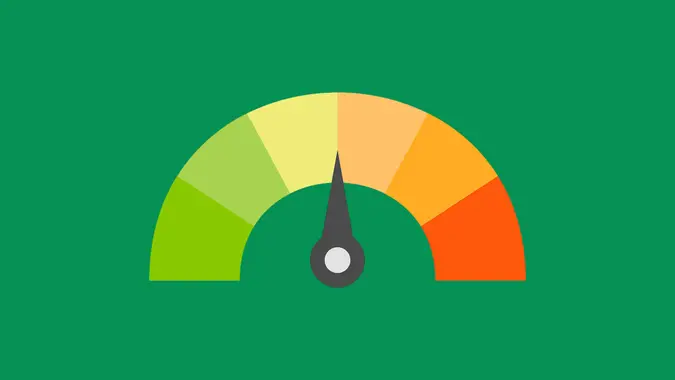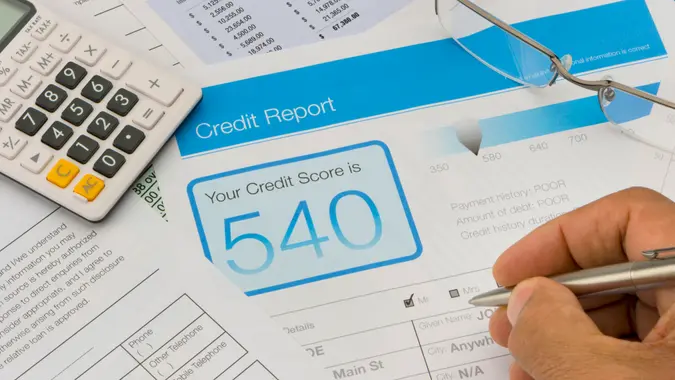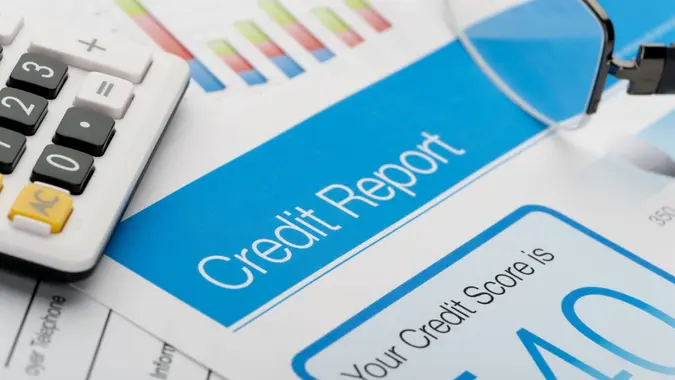What Is a Consumer Reporting Agency and What Do They Do?

Commitment to Our Readers
GOBankingRates' editorial team is committed to bringing you unbiased reviews and information. We use data-driven methodologies to evaluate financial products and services - our reviews and ratings are not influenced by advertisers. You can read more about our editorial guidelines and our products and services review methodology.

20 Years
Helping You Live Richer

Reviewed
by Experts

Trusted by
Millions of Readers
Consumer Reporting Agencies, or “CRAs” for short, are companies that gather and provide detailed information about your financial, credit and personal history.
Credit bureaus are the most common type of CRAs. However, not all CRAs are credit bureaus.
What’s the Point of Credit Reporting Agencies?
CRAs are governed by the Fair Credit Reporting Act (FCRA) and primarily function as information clearinghouses providing credit information about borrowers to lenders. Lenders use that information to assess a borrower’s creditworthiness and ability to repay his or her loan.
CRAs create reports that companies use when you apply for a loan or credit card, rent an apartment or apply for a certain job.
What Kind of Information Do Consumer Reporting Agencies Collect?
Consumer reporting agencies collect all types of information on personal and financial life. Here is a snapshot of what they collect:
- Payment history: If you’re paying your loans and credit cards on time
- Credit inquiries: This is a record of who has checked your credit because you requested a new credit line
- Public records: If you filed a bankruptcy or have other court records
- Rental history: Your rental history and number of evictions
- Employment history: Where you were employed
- Criminal and legal history: Judgements and criminal convictions
Examples of Consumer Reporting Agencies
| CRA Type | Example of Agency | What They Track |
|---|---|---|
| Credit bureaus | Experian, TransUnion, Equifax | Credit history, loan payments, debt levels, public records |
| Tenant Screening Agencies | Core Logic, First Advantage | Rental history, evictions, criminal background, payment records |
| Employment Screening Agencies | HireRight, First Advantage | Employment history, criminal records, education verification |
| Insurance Reporting Agencies | LexisNexis C.L.U.E., A-PLUS Property | Auto and home insurance claims history |
| Check Verification Services | CHEXSystems, TeleCheck | Bounced checks, fraud history, banking habits |
| Medical Information Bureau | Medical Information Bureau | Medical conditions, insurance applications, disability claims |
The big three credit bureaus are the most well-known CRAs:
- Experian: Founded in 1996, Experian frequently updates its data and uses “Experian Boost” which adds utility and phone payments to credit scores.
- Equifax: The oldest credit bureau that’s regularly updated by lenders and offers fraud prevention and identity protection.
- TransUnion: Found in 1968, it’s continuously updated by lenders and offers TruValidate which is a fraud detection and identity verification service.
Other types of CRAs include:
- Tenant screening agencies: These agencies check rental history for landlords.
- Employment background check agencies: Work history and employer records are kept for these agencies.
- Medical Information Bureau: Your disability claims and insurance applications are cataloged by the Medical Information Bureau.
- Insurance Reporting Agencies: These agencies specialize in auto and home insurance claim history.
- Check verification services: These agencies track your check writing history at retailers and other vendors.
How Do Consumer Reporting Agencies Affect Your Life?
Reports can help decide:
- Approvals: You can get approved or denied for a loan, credit card or apartment.
- Interest: You may pay a higher or lower interest rate based on the information collected.
- Job offers: You may be approved or declined for a job due to a background check.
What Are Your Rights with Consumer Reporting Agencies?
- You can see what each credit bureau is including in your credit reports for free
- If you spot a mistake, you’ve got the right to contest any inaccuracies
- The consumer reporting agencies must investigate disputes within 30 days.
Knowing these rights can protect your credit and financial reputation. Don’t be afraid to exercise your rights.
How to Check Your Reports from Consumer Reporting Agencies
It is easy to get your credit report from Experian, Equifax and TransUnion. To access your credit reports you can visit AnnualCreditReport.com.
There are specialty consumer reporting agencies that collect information on the following:
- Employment screening reports
- Tenant screening
- Deposit account and payment screening
- Personal property insurance
- Medical specialty report
You can get access to those reports through the CFPB’s website.
The Bottom Line
Consumer reporting agencies play a crucial role in shaping financial opportunities, from securing loans to renting an apartment. Understanding how they collect, store and share your financial data can help you take control of your credit profile and make informed financial decisions.
By regularly checking your credit reports, disputing inaccuracies and practicing responsible credit habits, you can maintain a strong financial standing and protect your personal information.
FAQ
Figuring out the details around credit and credit scores can be confusing and frustrating for consumers, to say the least. It's only natural to have some questions while looking into it. Here are some of the frequently asked questions that come up while looking into what is a consumer reporting agency:- What is a consumer reporting agency?
- A consumer reporting agency (CRA) is an organization that collects, maintains and shares consumer credit and personal financial data. Lenders, landlords, employers and insurance companies use reports from CRAs to assess creditworthiness, rental history and financial responsibility. Examples of major CRAs include Experian, Equifax, and TransUnion.
- Are credit bureaus and consumer reporting agencies the same?
- Not exactly. Credit bureaus are a type of consumer reporting agency that specifically focuses on credit-related data, such as payment history and outstanding debt. However, other types of CRAs specialize in different areas, like tenant screening, employment background checks and insurance claims.
- What information do consumer reporting agencies collect?
-
Consumer reporting agencies collect a variety of financial and personal data, including:
- Credit history (e.g., payment history, outstanding debts, credit utilization)
- Public records (e.g., bankruptcies, liens, judgments)
- Rental history (for tenant screening CRAs)
- Employment background information (for employment screening CRAs)
- Insurance claims history (for insurance-related CRAs)
-
- How can I check my consumer report for free?
- You can access your credit report for free once a year from each of the three major credit bureaus -- Experian, Equifax, and TransUnion -- at AnnualCreditReport.com. For other types of consumer reports, you can request a copy directly from the specific CRA that maintains your data. The Consumer Financial Protection Bureau (CFPB) provides a list of consumer reporting agencies and how to request reports from them.
Editorial Note: This content is not provided by any entity covered in this article. Any opinions, analyses, reviews, ratings or recommendations expressed in this article are those of the author alone and have not been reviewed, approved or otherwise endorsed by any entity named in this article.
Our in-house research team and on-site financial experts work together to create content that’s accurate, impartial, and up to date. We fact-check every single statistic, quote and fact using trusted primary resources to make sure the information we provide is correct. You can learn more about GOBankingRates’ processes and standards in our editorial policy.
- FTC "Fair Credit Reporting Act"
- FTC "Credit Reporting"
- AnnualCreditReport.com "website"
- Consumer Financial Protection Bureau "List of consumer reporting companies"
- Consumer Financial Protection Bureau "MIB, Inc."
 Written by
Written by  Edited by
Edited by 






















